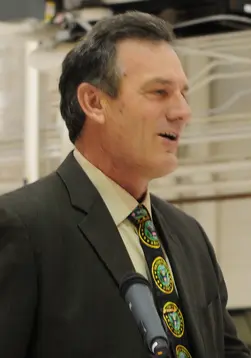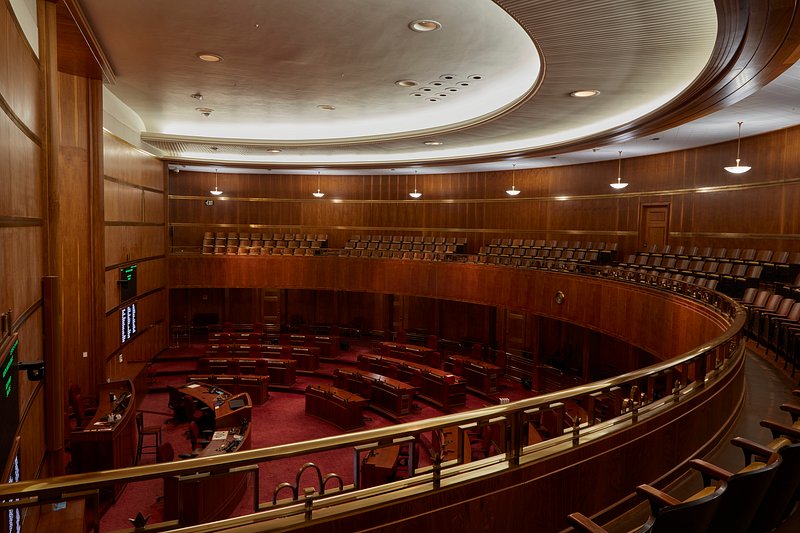The South Dakota State Capitol in Pierre was a hive of activity as House Representatives gathered to hear Gov. Kristi Noem deliver the State of the State address on Tuesday, January 9, 2024. This marked the commencement of the historic 100th session of the South Dakota Legislature, significant not only for its centennial milestone but also due to transitions in leadership. Governor Noem is set to address the assembly again on January 14 before her journey to Washington, where she faces hearings on her nomination to become the Secretary of the Department of Homeland Security under President-elect Donald Trump’s administration.
The historic session in Pierre represents an epoch of legislative shifts and challenges. Anticipated topics of discussion are the three Ps – property taxes, pipelines, and prisons, alongside debates over school vouchers, Medicaid funding, and child care programs.
Addressing Property Tax Relief: A Balancing Act
Given recent escalations in property tax payments, with nearly 60% increases in residential and 50% in commercial properties over the past decade, property tax relief has become a main agenda in Pierre. The challenge is maintaining funding for local schools and government services that rely heavily on property taxes. Enter Rep. Tony Venhuizen, whose proposal seeks to increase the sales tax rate from 4.2% to 5%, bolstering general fund revenue by an estimated $280 million to reduce school funding levies to zero.
“This is meant to start the conversation on property tax relief and to make the point that it costs a lot of money,” said Venhuizen, supported by Sen. Randy Deibert. Yet, the proposed tax shift faces opposition from limited-government advocates and is unlikely to persuade the significantly outnumbered Democrats in South Dakota’s legislature.
Rep. Kadyn Wittman voiced concerns for low-income individuals, suggesting the removal of the grocery tax would be a more equitable solution compared to raising sales tax, which voters had dismissed on previous ballots due to broad language, not the concept itself.
The School Voucher Controversy
Kicking off significant discourse is Governor Noem’s push for ‘education savings accounts’ intended to facilitate school vouchers, empowering parents with funds to enroll kids in private or alternative schooling options. These education investments, introduced by House Bill 1020, aim to diversify educational choices but face resistance from organizations advocating public school transparency and accountability.
Critics argue such proposals divert funds from essential public education systems that serve diverse populations. Nevertheless, Noem asserts that the initiative will not diminish public school funding, pointing instead to an intention of introducing competition within the state’s educational framework.
Eminent Domain: Pipeline Politics
The contentious debate over the Summit Carbon Solutions pipeline project pulses through Pierre, revolving around the issue of eminent domain. Eminent domain, a legal mechanism to acquire private land for public use, is scrutinized, especially regarding whether the proposed pipeline qualifies as a ‘common carrier’ under South Dakota law.
Anti-pipeline advocates, spearheaded by the South Dakota Property Rights and Local Control Alliance, contest the fairness in private property acquisitions. Expressing the sentiment, Jim Eschenbaum highlighted the necessity for stricter eminent domain regulations, contrasting current projects with public-benefit infrastructures like highways.

Gov. Kristi Noem
Medicaid Expansion Out for Scrutiny
With the 2022 voter-approved Medicaid expansion extending health coverage to more South Dakotans under the Affordable Care Act, looming threats come from proposed legislative amendments. Current provisions require the state to maintain expanded coverage while the federal government shoulders 90% of costs. The amendment suggests discontinuation if federal support dips below this threshold.
“We would have to come up with the money and pay it. So the point of this amendment is to say, if it drops below 90%, then it’s up to the Legislature,” said Venhuizen, eyeing potential fiscal liabilities if federal contributions wane.
Critics, including Rep. Wittman, argue these proposals target vulnerable populations, stressing the need for thoughtful allocation of taxpayer resources rather than reducing existing support systems.
Budget Cutbacks: Broadcasting and Corrections
Among Governor Noem’s budgetary tightening is a proposed 65% slash in funding for South Dakota Public Broadcasting, stirring widespread disapproval. The network, crucial for rural news, weather, and educational content, could see significant operational impacts if the cuts proceed.
Noem remains focused on another substantial fiscal agenda – finalizing a new men’s state prison plan. The project promises expanded corrections facilities, addressing state penalties’ rehabilitation capacities, though some lawmakers voice concerns over the proposed location reflecting sentiments akin to those opposing pipeline projects.

Lt. Gov. Larry Rhoden
As South Dakota gears up for challenging debates around property taxes, education funding, and fiscal management, the legislative session mirrors broader national dialogues on governance and resource distribution. South Dakota News Watch continues to cover these pivotal political developments.
For full coverage, visit South Dakota News Watch and sign up for their email newsletter to receive updates. Reach Stu Whitney at [email protected].
